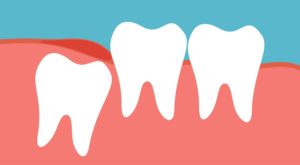Wisdom teeth are the last set of molars that most people get in their late teens or early twenties. While some people have no issues with their wisdom teeth, others may experience discomfort and complications. Knowing the signs of wisdom teeth coming in can help you take appropriate action and seek dental advice when necessary. Here are eight possible signs that your wisdom teeth are on their way.

1. Pain at the Back of Your Mouth
One of the first and most common signs of wisdom teeth coming in is pain at the back of your mouth, behind your molars. This pain can come and go, and it might be mild or severe. It often happens because your wisdom teeth are pushing through your gums, which can be quite uncomfortable. The pushing phase can cause a sensation similar to teething, where you feel pressure and soreness.
2. Swollen and Tender Gums
As your wisdom teeth begin to emerge, the gums in the back of your mouth may become swollen and tender. You might notice redness around the area where the teeth are coming in. This swelling is a natural response to the new teeth breaking through the gums and can cause discomfort when chewing or brushing.
3. Difficulty Opening Your Mouth

If your wisdom teeth are causing problems, you might find it hard to open your mouth fully. This can happen because the emerging teeth can create pressure and inflammation around your jaw, making it difficult to move your mouth as you normally would. This limited movement can affect your ability to eat and speak comfortably.
4. Bad Breath or Unpleasant Taste
Another sign of wisdom teeth coming in is persistent bad breath or an unpleasant taste in your mouth. This can happen because the partially erupted teeth create small openings where food particles and bacteria can get trapped. If these areas are not cleaned properly, they can lead to bad breath and even infections.
5. Headaches and Jaw Pain
The pressure from wisdom teeth coming in can cause headaches and jaw pain. This is often because the new teeth can push against other teeth or the jawbone, leading to discomfort that can radiate to your head. A wisdom tooth headache can feel like a dull, throbbing pain that is hard to pinpoint but often linked to the tension in your jaw.
6. Shifted or Crowded Teeth
If you notice that your teeth are starting to shift or become crowded, it might be because of your wisdom teeth. These new teeth can push your other teeth out of alignment as they try to make space for themselves. This can lead to crowded teeth, which can affect your bite and make it harder to clean your teeth properly.
What are the First Signs of Wisdom Teeth?
The first signs of wisdom teeth can include mild discomfort at the back of your mouth, swollen gums, and slight pain. These initial signs are often easy to overlook, but paying attention to these subtle changes can help you catch potential issues early on.
What Does Wisdom Teeth Coming Through Feel Like?
When your wisdom teeth come through, it can feel like a dull pressure or aching at the back of your mouth. The gums may feel tender and sore, and you might notice a bit of swelling. This feeling is similar to the sensation of teething experienced by infants, though it can be more intense due to the larger size of wisdom teeth.
At What Age Do Wisdom Teeth Come In?

Wisdom teeth typically appear between the ages of 17 and 25. However, some people may get them earlier or later. According to Boise Oral Surgery, this age range is when most people have their wisdom teeth evaluated to determine if they need to be removed.
What Triggers Wisdom Teeth to Grow?
The exact triggers for wisdom teeth to grow are not entirely understood, but they generally start to develop during late adolescence when the jawbone has reached its adult size. Hormonal changes during this time may also play a role in the growth and eruption of wisdom teeth.
At What Stage Do Wisdom Teeth Hurt?
Wisdom teeth can cause pain at various stages, but the most common time for discomfort is when they begin to push through the gums. This stage is when the teeth are actively trying to emerge, causing pressure and inflammation in the surrounding tissues.
What Happens If You Wait Too Long to Get Wisdom Teeth Out?
Waiting too long to get wisdom teeth out can lead to several complications. Impacted wisdom teeth can cause crowding, infections, cysts, and even damage to adjacent teeth. Delaying removal can make these issues worse and potentially lead to more complex and painful procedures later on.
What Happens If You Never Get Your Wisdom Teeth Pulled Out?
If you never get your wisdom teeth pulled out, and they don’t cause any problems, you might not need to worry. However, many people experience complications such as infections, crowding, and pain, which can necessitate removal. Regular dental checkups can help monitor the situation and ensure that any issues are addressed promptly.
Do Wisdom Teeth Have to Be Removed?
Not all wisdom teeth need to be removed. If they come in properly aligned and do not cause pain or other problems, they can stay. However, if they are impacted, cause pain, or threaten the health of other teeth, removal is often recommended.
What Does a Wisdom Tooth Headache Feel Like?
A wisdom tooth headache typically feels like a dull, throbbing pain that starts at the back of your mouth and radiates to other areas of your head. This type of headache is often associated with tension and discomfort in the jaw and can be quite persistent.
Conclusion
Knowing the signs of wisdom teeth coming in can help you prepare and take appropriate action. From pain and swelling to headaches and infections, these signs indicate that it’s time to consult with your dentist. Early detection and treatment can prevent complications and ensure that your dental health remains in good shape. Regular dental checkups are essential for monitoring the growth of your wisdom teeth and determining the best course of action.


 Due to recent weather-related closures and delays, select Lane & Associates Family Dentistry offices will have adjusted hours this Friday, January 30th. Some locations will be closing at 2:00 PM, while others will remain open until 5:00 PM. Please contact your local Lane & Associates office to confirm hours and availability.
Due to recent weather-related closures and delays, select Lane & Associates Family Dentistry offices will have adjusted hours this Friday, January 30th. Some locations will be closing at 2:00 PM, while others will remain open until 5:00 PM. Please contact your local Lane & Associates office to confirm hours and availability.